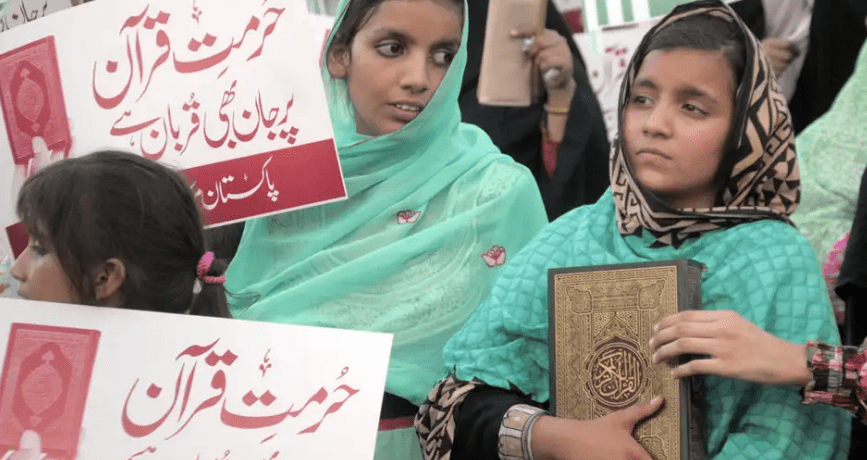
On Wednesday, the UN Human Rights Council (UNHRC) passed a resolution strongly opposing recent acts of Quran desecration.
Despite widespread opposition from nations worried about restrictions on free expression, the resolution ultimately passed.
There were 28 yes votes, 12 no votes, and 7 abstentions out of a total of 47 council members.
The ‘alarming surge’ of religiously motivated violence
On Tuesday, the UNHCR held an emergency meeting in response to a request from Pakistan to discuss religious freedom and free expression.
According to Pakistan and other countries, they were compelled to take action because of “the alarming rise in premeditated and public acts of religious hatred as manifested by recurrent desecration of the Holy Quran in some European and other countries.”
In Islam, blasphemy is committed when the Quran is treated disrespectfully.
“We must see this clearly for what it is: incitement to religious hatred, discrimination, and attempts to provoke violence,” Pakistani Foreign Minister Bilawal Bhutto-Zardari said in a video message to council members.
Disrespectful comments and deeds include those directed towards Muslims, Jews, Christians, and other religious minorities such the Ahmadis, Baha’is, and Yazidis. UN High Commissioner for Human Rights Volker Türk stated of the statements before the start of the special session, “They are offensive, irresponsible, and wrong.”
Türk said that awareness, discourse, education, and interfaith involvement are necessary to prevent hate speech. Public Quran burnings, he said, “appear to have been manufactured to express contempt and inflame anger; to drive wedges between people; and to provoke, transforming differences of perspective into hatred and, perhaps, violence.”
“Powered by the tidal forces of social media, and in a context of increasing international and national discord and polarization, hate speech of every kind is rising everywhere,” stated Türk. “It’s bad for people on an individual level, and it erodes the social solidarity that’s essential to a healthy society.” Conflicts may arise when free speech is pitted against religious liberty.
On June 28, a Quran was burned outside of Stockholm’s major mosque, setting up a worldwide outrage among Muslims.
On Tuesday or later this week, Pakistan and the Organization of Islamic Cooperation want to approve a resolution on the subject of Quran burning.
Regardless of the law or one’s own beliefs, Türk said, “people need to act with respect for others.”
In response to the “Islamophobic” conduct, the right-wing administration in Sweden stated it was obligated to safeguard the “constitutionally protected right to freedom of assembly, expression, and demonstration.”
In his lecture, Türk argued that “every national limit on the greater right of free speech and free expression of opinion must be so formulated so that its only task, its only outcome can be the protection of the individual — and not the protection of religious doctrines from critical analysis.”
He saw a future when people are more targeted for maltreatment based on their religion, race, or sexual orientation.
He said that social media contributed to domestic and worldwide strife. He claimed that certain nations had a problem with the politicization of religion.
The UNHRC is now holding its second of three yearly sessions. It will be discussed in the context of balancing religious freedom with the right to free expression.
On June 28, a Quran was burned outside of Stockholm’s major mosque, setting up a worldwide outrage among Muslims.
On Tuesday or later this week, Pakistan and the Organization of Islamic Cooperation want to approve a resolution on the subject of Quran burning.
Regardless of the law or one’s own beliefs, Türk said, “people need to act with respect for others.”
In response to the “Islamophobic” conduct, the right-wing administration in Sweden stated it was obligated to safeguard the “constitutionally protected right to freedom of assembly, expression, and demonstration.”
In his lecture, Türk argued that “every national limit on the greater right of free speech and free expression of opinion must be so formulated so that its only task, its only outcome can be the protection of the individual — and not the protection of religious doctrines from critical analysis.”
He saw a future when people are more targeted for maltreatment based on their religion, race, or sexual orientation.
He said that social media contributed to domestic and worldwide strife. He claimed that certain nations had a problem with the politicization of religion.
The UNHRC is now holding its second of three yearly sessions. It starts today and ends on Friday.As of today, Friday, all societies’ operating.”








